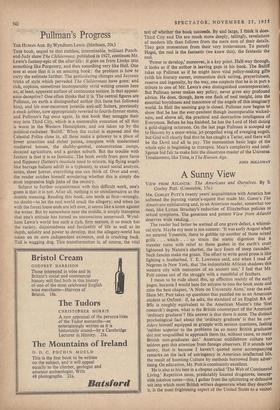Pullman's Progress
THE HUMAN AGE. By Wyndham Lewis. (Methuen, 30s.) This book, sequel to that ruthless, interminable, brilliant Punch- and-Judy show The Childermass, published in 1927, continues Mr. Lewis's fantasy-epic of the after-life: it goes on from Limbo into something like Purgatory, and then something very like Hell. One sees at once that it is an amazing book : the problem is how to carry the estimate further. The gesticulating changes and Joycean tricks of style which pervaded The Childermass have gone; and rich, copious, sometimes incomparably vivid writing creates here an, at least, apparent surface of continuous texture. Is that appear- ance deceptive? One often thinks that it is. The central figures are Pullman, on earth a distinguished author (his fame has followed him), and his ever-recurrent juvenile anti-self Satters, previously a stock-jobber, now appropriately reverted to fourth-former status, and Pullman's fag once again. In this book they smuggle their way into Third City, which is a memorable evocation of all that is worst in the Western Hemisphere, and are taken up by the political-racketeer 'Bailiff.' When the racket is exposed and the Celestial Police close in, all three make a getaway to a place of fewer amenities and richer patina, complete with modernised mediaeval houses, the shabby-genteel, concentration camps, decayed agriculture, and a garden suburb. But the trouble with fantasy is that it is so fantastic. The book swirls from pure farce and flippancy (Satters's insatiate need to urinate, big flying angels like barrage ballons adrift in a typhoon), to exact social analysis, satire, sheer horror, everything one can think of. Over and over, the reader catches himself wondering whether this is simply the most impressive high jinks of the century.
Subject to further acquaintance with this difficult work, one's guess is that it is not. After all, nothing is so uninformative as the double meaning. Reading this book, one tends at first—wrongly, no doubt—to let the real world crack the allegory; and when (as with the farce) loose ends are left over, it seems like a score against the writer. But by somewhere near the middle, it simply transpires that one's attitude has turned an unconscious somersault. Wynd- ham Lewis's world has such a rich, firm texture, it so much has the variety, disjointedness and farcicality of life as well as its depth, solidity and power to develop, that the allegory-world has taken on its own independent existence, and is cracking back Tail is wagging dog. This transformation is, of course, the vita
test of whether the book succeeds. By and large, I think it does. Third City and Dis are much more deeply, tellingly, revelations of modern life than follows from the mere sum of their details. They gain momentum from their very irrelevances. To parody Hegel, the real is the fantastic (we knew this); the fantastic the real.
'Power to develop,' moreover, is a key point. Half-way through, it looks as if the author is leaving gaps in his book. The Bailiff takes up Pullman as if he might have vital policy-making gifts (with his literary career, immaculate dark suiting, prayerfulness, reserve and ingenuity, by the way, one suspects that he is in part a tribute to one of Mr. Lewis's own distinguished contemporaries). But Pullman never makes any policy, never gives any profound advice. He does, though, have one flash of real insight, into the essential boyishness and innocence of the angels of this imaginary world. In Hell the seeming gap is closed. Pullman now begins to show that he has the ever-penitent though incomparable wicked- ness, and above all, the practical and destructive intelligence of Everyman. Before he has finished, he has the Lord of Hell dating a gold-digging octoroon. On the last page Pullman is scooped up to Heaven by a snow-white, jet-propelled wing of avenging angels, but God will clearly find that he has caught a Tartar, and there will be the Devil and all to pay. The momentous basic logic of the whole epic is beginning to transpire. Man's complexity and intel- ligence bid fair to make him the disastrous master of the Universe. Timelessness, like Time, is The Human Age.
JOHN HOLLOWAY


























































 Previous page
Previous page